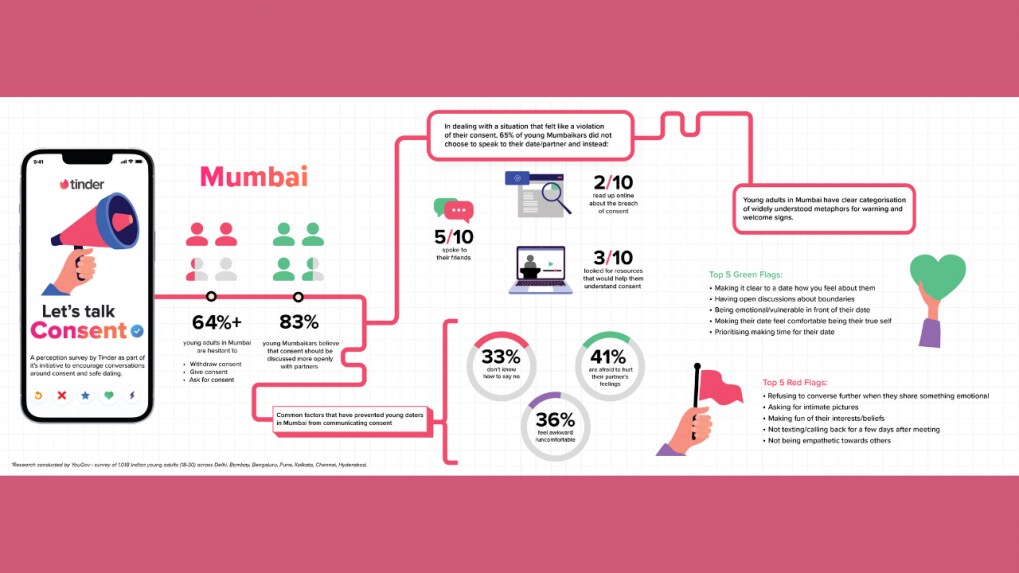Young adults don’t know how to give, ask or withdraw consent while dating, Tinder study
When asked about situations when their consent was violated, 65% of young Mumbaikars chose not to speak to their date/partner about it and turned to a friend and looked for resources online.
ADVERTISEMENT
Dating app Tinder, in a recent survey, reveals that most young adults in India have little or no confidence in navigating consent and find it hard to have conversations on the subject. Amongst those surveyed in Mumbai, more than 64% of young adults are hesitant to give consent, ask for it, and to withdraw consent when dating someone.
When asked about situations when their consent was violated, 65% of young Mumbaikars chose not to speak to their date/partner about it and turned to a friend and looked for resources online, illustrating the need for continuous dialogue on this subject. In fact, 83% of these young adults in Mumbai believe that consent should be discussed more openly with partners.
The findings are based on research conducted by YouGov which surveyed 1,018 young adults (18-30 years) across Delhi, Mumbai, Bengaluru, Pune, Kolkata, Chennai and Hyderabad.
Young Indians want to learn and discuss consent with 1 in 2 recognizing themselves as the biggest channel for normalizing conversations around consent.
Around 8 in 10 young adults in Mumbai believe that consent should be discussed more openly with partners, 76% want it to be even taught formally in schools and colleges, and 72% have taken steps to personally understand the concept of consent.
More than 7 in 10 young adults in Mumbai seek more resources and safe spaces (both physical and online) on consent to be more educated and aware in their personal settings. Amongst a broad group of stakeholders potentially responsible for normalizing conversations on consent, young people identified parents (55%), themselves (44%), and schools and colleges (39%) as the top three influencers responsible for that conversation.
Across various aspects of consent education, most of the young Mumbaikars are most interested in learning about how to give consent (44%), understanding their own boundaries and limitations (41%), followed by how to ask for consent (40%), emphasizing the need for consent education in the city.
The survey highlights that there are a myriad of factors that prevent young adults from communicating consent or the lack thereof to their dates or partners. The most frequent reasons include: afraid of hurting the date/partner’s feelings (41%), themselves are awkward having such conversations (36%), not knowing how to say no (33%) and anxious about not being liked (30%).
Young adults in Mumbai also have clear categorisation of widely understood metaphors for warning signs.They listed top three red flags include making fun about your interests/beliefs, asking for personal/intimate pictures, and not being empathetic towards others.
Yet putting them into practice proves harder than imagined: 3 in 5 young Mumbaikars say that they would hesitate to say no to a kiss and an almost equal number say they would hesitate to dismiss intimate advances even though it might make them uncomfortable.
Young adults in Mumbai believe that consent extends beyond intimacy and includes a larger concern for privacy and emotional boundaries. The survey was a part of Tinder’s effort to create awareness around the importance of consent. The platform is bringing back ‘Let’s Talk Consent’, its initiative to encourage conversations around consent and safe dating. This year, the campaign launches with “We Need To Talk”, a short film that explores the nuances of consent in interpersonal relationships amongst young Indian adults.
This will be followed by a Consent and Safe Dating curriculum, developed by experts and available online and in person in select universities, to give young adults access to appropriate information and a safe space to have a healthy discourse on the subject. ''Our Let’s Talk Consent initiative aims to give young adults the tools and resources to understand how consent equates freedom in making choices, mutual agreement and normalizes open discussions on tough topics. Coupled with safety products in the app and initiatives such as these, we are committed to working towards creating a healthy dating ecosystem in the country,” says Taru Kapoor, GM, Tinder & match group, India.

